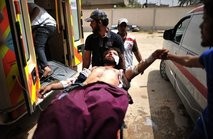Demonstrators torched British and Italian diplomatic buildings in Tripoli after Libya accused NATO of trying to assassinate Moamer Kadhafi in an attack that killed one of his sons and three young grandchildren.
And the port in the besieged rebel-held city of Misrata was set ablaze in a deadly bombardment by forces loyal to the Libyan strongman, witnesses said Sunday.

Libyan government spokesman Mussa Ibrahim told reporters in Tripoli that the house of Kadhafi's second-youngest son, Seif al-Arab, "was attacked tonight with full power.
"The attack resulted in the martyrdom of brother Seif al-Arab Moamer Kadhafi, 29 years old, and three of the leader's grandchildren," all of whose parents were siblings of Seif.
Kadhafi and his wife were in the building with his son, Ibrahim said, calling the strike "a direct operation to assassinate the leader," who he said "is in good health; he wasn't harmed. His wife is also in good health."
Official JANA news said funerals for those killed would be held Monday following afternoon prayers.
On Sunday night, three explosions were heard in eastern Tripoli as jets overflew, witnesses said.
NATO on Saturday night said it kept up precision raids on military installations in Tripoli, "including striking a known command-and-control building in the Bab al-Aziziya neighbourhood."
Ibrahim said Kadhafi's location was "leaked."
"They knew about him being there, or expected him for some reason."
The children killed were a boy and a girl, both aged two, and a baby girl of four months, he said.
Hours after the attack, demonstrators set fire to the Italian embassy and the residences of the Italian and British ambassadors in Tripoli, an AFP correspondent said, adding the buildings were vacant.
Rome and London confirmed their missions had been targeted, and British Foreign Secretary William Hague announced the expulsion of the Libyan ambassador in response.
"The Vienna Convention requires the Kadhafi regime to protect diplomatic missions in Tripoli. By failing to do so that regime has once again breached its international responsibilities and obligations."
The Italian foreign minister denounced the "grave and vile actions."
Britain had recalled its envoy to Tripoli at the start of the conflict, and Italy shut down its mission in March.
Deputy Foreign Minister Khaled Kaim described the attacks on diplomatic missions as "regrettable," and said Libya would take responsibility for repairs.
Police, he said, were overwhelmed by the crowds.
In Rome, Prime Minister Silvio Berlusconi came under pressure from right-wing coalition partners to fix a deadline for Italy's participation in Libyan air strikes. Members of the Northern League called for a parliamentary vote.
In New York, the United Nations said it would pull its staff out of Tripoli.
UN staff remains in the rebel bastion of Benghazi in eastern Libya and elsewhere as it seeks to stave off a humanitarian disaster with tens of thousands of Libyan refugees fleeing to neighboring countries.
British Prime Minister David Cameron called NATO's targeting policy "in line" with the UN resolution authorising the strikes to protect civilians.
But Russia called for an immediate ceasefire, saying it had "serious doubts" the West was not targeting Kadhafi.
The Roman Catholic Bishop of Tripoli, Giovanni Martinelli, confirmed to an Italian television channel that Seif al-Arab was killed.
He appealed for an end to the bombing. "I ask, please, out of respect for the pain due to the loss of a son, a gesture of humanity towards the leader," he said.
























